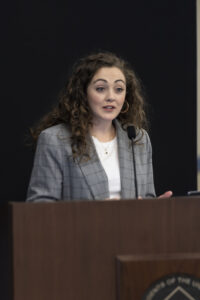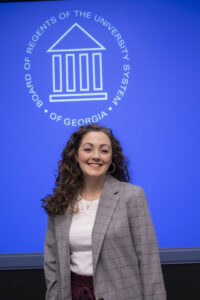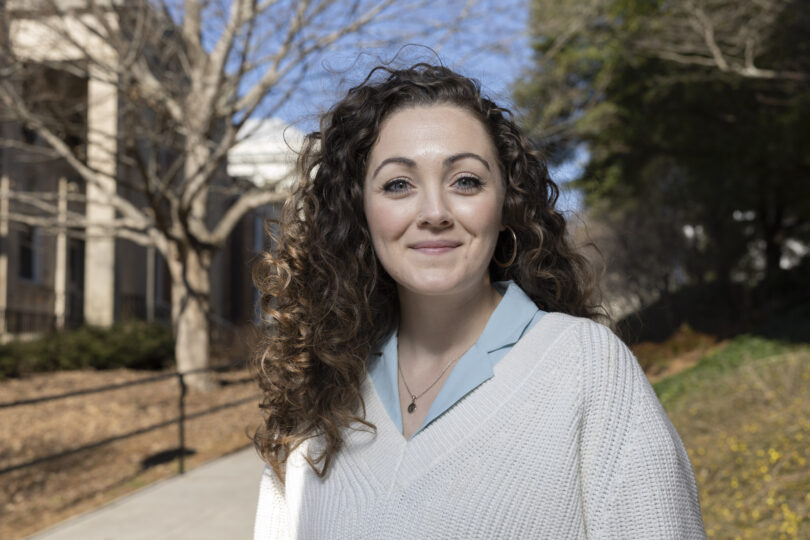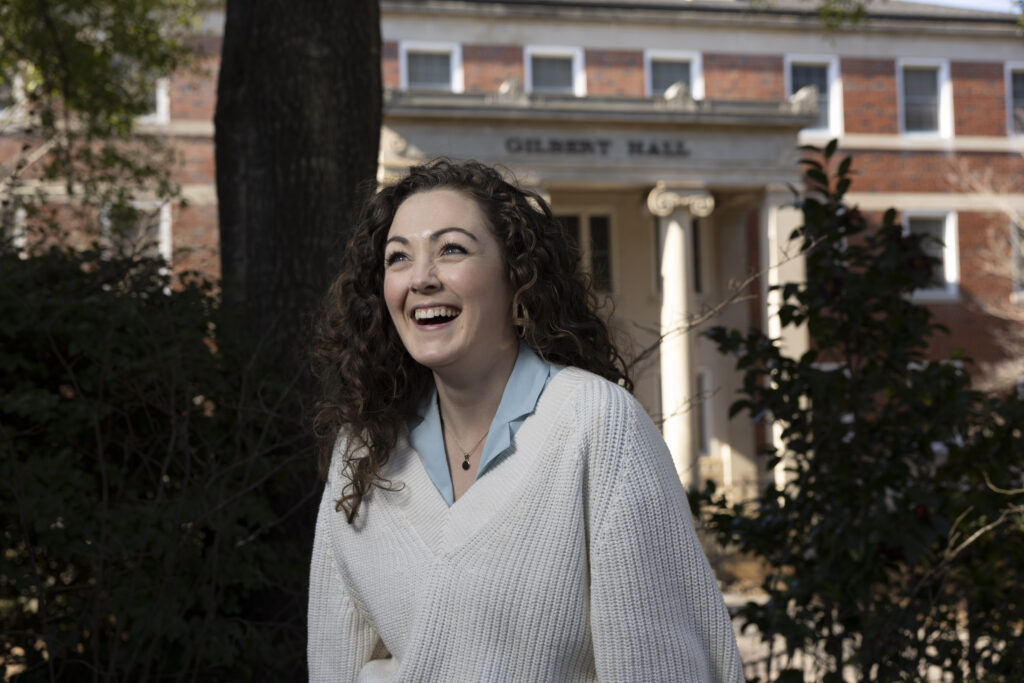Shannon Rodriguez studies a dialect of English spoken by Latinos born in Georgia, a particular blend of Southern drawl, clipped Latino vowels and a more general mainstream American accent. Speakers pull features from each to emphasize different parts of their identity.
In January, she presented her Three Minute Thesis presentation to the board of regents. Rodriguez was a runner up for UGA’s Three Minute Thesis Competition. Her presentation was based on her dissertation, “Latino English in Georgia: a sociophonetic analysis of ethnicity and identity.”

Shannon Rodriguez presents her Three Minute Thesis presentation (based on her dissertation research) at the 2022 University System of Georgia January Board of Regents meeting. (Submitted photo)
The work has a personal angle for the Ph.D. candidate.
“I am a white female and my husband and his family are Latino,” said Rodriguez. Her children, aged 1 and 3, are Southern Latinos and will eventually find their way to their own “ethnolect,” a dialect spoken by a particular ethnic group. “It’s very close to home for me.”
While conducting her research, Rodriguez interviewed Latinos and Hispanics across Georgia who have lived here most of their lives. She asked them questions like “What does it mean to be Latino? What does it mean to be Southern?” Rodriguez applied the tools of linguistics to drill down on how an ethnolect can vary. “I look at the acoustic phonetics. I look at the vowels and their trajectories in vowel spaces, the way they’re pronounced and see how they might be different within speakers of Latino English,” she said.
Then she codes their interview data for identity topics around ethnicity and place, she said. She wants to know if a subject identifies more strongly with where they live, the Latino community or—most likely—a unique personal combination.

Rodriguez at the 2022 University System of Georgia January Board of Regents meeting. (Submitted photo)
“All of those things play a factor in whether they sound more Latino or Southern, or more mainstream American. It’s the way that they’re identifying themselves, how they use their vowels to point to those different features of their identity.”
It’s similar to how we mirror other people’s postures and behaviors, but with language. “I think something that gets misunderstood about dialect is that it’s not being inauthentic or someone choosing to make themselves sound different. It’s a linguistic process,” she said. At the same time, there’s a push and pull between the unconscious and conscious decisions in the way we talk, depending on circumstances, she said. We would speak differently to a professor than we would to a child who needs to get in bed this very second.
“All language is a type of performance but it’s not inauthentic. We’re all using our words to tell something to somebody,” she explained.
The big takeaway? “Southern Latinos are not a monolith and do not all sound the same. Within their ethnicity, they identify very differently, so variations of their ethnolect sound different. And there’s beauty in that diversity,” she said, adding that these variations don’t mean anyone is less Latino, Southern or American.
Rodriguez grew up in the small town of Westminster, South Carolina, then earned her Bachelor of Arts at North Greenville University in interdisciplinary studies with a focus on Spanish and linguistics. She’s finishing up her Ph.D. this year and will graduate in May. She plans to have a postdoctoral research fellowship lined up at UGA and her long-term goal is to teach linguistics at a university and continue to do research. She also wants to mentor students because she was so inspired by her own UGA mentors.
“Dr. Chad Howe and Dr. Paula Mellom have been phenomenal. I’ve learned so much academically from them, but I’ve also learned a lot about what it means to be an academic and have a family, and what it means to have that kind of research/life balance,” she said. (Actually achieving that balance when you have a 3-year-old and 1-year-old is still a little tricky. “You feel like you fail all the time,” she laughed.)
She credits UGA for helping her become her best. “As an R1 institution, UGA and especially the linguistics department does a really good job of pushing and challenging us, but also giving us grace,” she said.
Rodriguez hopes her research can help bring awareness to the value of linguistic diversity, even within a language itself. “There’s no one way to sound American or even Southern or Latino. I hope that my work can help break down the misconception that Latino English is Spanish-accented English, but is a vibrant ethnolect of native English with healthy dialectal variation among its speakers.”









